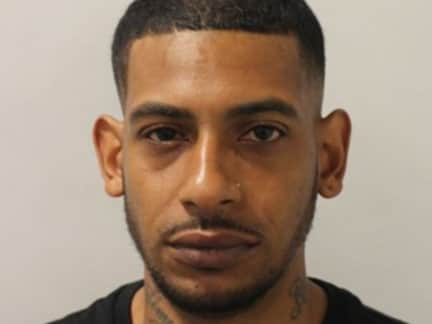How the Met Police infiltrated criminals’ secret Encrochat messages and stopped their plans of kidnap & torture
and live on Freeview channel 276
Lee Nervais was known as a ‘fixer’. His job was to arrange and carry out violent attacks on behalf of some of the world’s most dangerous organised crime groups.
He did this by conversing with other criminals on an encrypted messaging platform called Encrochat, which helped users disguise their identities by giving them a unique “handle” made up of a random noun and adjective.
Advertisement
Hide AdAdvertisement
Hide AdThe site was accessed using specially modified handsets, which meant users could only communicate with other Encrochat devices, and had built-in systems which would wipe all data if handed over to the police.
Because of this, Nervais - and thousands of other criminals - had “complete and utter faith in Encrochat”, the Met Police said. They never thought they would be caught, meaning they openly discussed plans to organise drug deals, source firearms, and arrange extreme violence on the platform.
However, over the course of a three-year investigation, known as Operation Eternal, the Met managed to infiltrate Encrochat - and target hundreds of organised crime figures using the platform.


In the case of Nervais, who used the handle ‘Showygator’, detectives found messages in which he revealed himself as an “individual who specialised in kidnapping and violence, when hired to do so by those at the top of serious and organised crime groups”.
Advertisement
Hide AdAdvertisement
Hide AdIn one instance, he was contacted by an illegal drugs importer, who requested he help kidnap and assault a man he believed to have lost or stolen 8kg of his cocaine. Nervais said he would do this for £15,000.
In another conversation, he said he would be able to “open [someone] up” for the same price - warning that this could “make him drop”, which courts later heard meant the victim could die.
Detectives built up evidence to prove Nervais was Showygator, including finding images of bathroom and kitchen renovations on the encrypted device which matched Nervais’ home address, and using geo-tracing which proved that his Encrochat account was not used in the UK when Nervais was known to be out of the country.
Nervais was unanimously found guilty of conspiracy to kidnap, two counts of conspiracy to commit grievous bodily harm, and two counts of conspiracy to supply Class A drugs, namely cocaine and heroin, at Wood Green Crown Court. He was jailed for 20 years in August 2022.
‘He thought he was completely untouchable’
Advertisement
Hide AdAdvertisement
Hide AdDetective Chief Inspector Driss Hayoukane, the senior investigating officer in the Met’s Operation Eternal, said: “Nervais made his money from extreme and senseless violence. The casual discussions he had around having people kidnapped and brutally assaulted, including the fact they could potentially die, is chilling and illustrate the danger he poses to society.
“He thought he was completely untouchable but did not expect the skills of our specialist crime team who are committed to dismantling the organised crime networks that seek to blight our streets.”
Nervais was just one of many criminals brought down by the Met’s infilitration of Encrochat. “Dangerous” Paul Fontaine was found guilty of conspiracy to murder, as well as a string of other offences, after police tracked his involvement in the transfer of a firearm which was subsequently used in the murder of 29-year-old Abdullahi Mahmoud in Enfield, London, on 19 March 2020.
Just weeks later, he helped get a gun to Cardiff career criminal Frankie Sinclair, which was to be used to murder members of a rival group. Sinclair was also found guilty of conspiracy to murder, plus other offences.
Advertisement
Hide AdAdvertisement
Hide AdThe Met used various techniques to bust the pair, but one of the most helpful was the fact that, on his encrypted device, Sinclair had a photo of his dog in his home living room. The dog happened to be sitting in the exact same spot when police officers raided his address, and detectives were therefore able to set up image recreations which added to their evidence.


Other examples include Jason Pusey, who was found guilty of distribution of Class A and B drugs after the Met traced him to the handle ‘irregularfrog’ because he had used his daughter’s name and birthday as his password; and Naki Aslan, a high-ranking gang member, who was sentenced to 23 years in prison for conspiring to import more than 20kg of heroin and cocaine.
Aslan was also found to have asked an associate to shoot someone for him, with his messages reading: “You got anyone to fire a couple of shots? From the waist down but urgent. I wanna get him popped ASAP.”
The list goes on. Overall, the Met said that 426 people had been jailed for a total of 3,722 years as part of Operation Eternal, since it began in March 2020. Some 942 arrests have been made, with 784 people charged.
Advertisement
Hide AdAdvertisement
Hide AdIn a separate but linked investigation, led by the National Crime Agency (NCA) and known as Operation Venetic, more than 1,200 criminals using Encrochat have been jailed.
Encrochat has been shut down since the Met and NCA began their investigations, after its operators realised they had been infiltrated, but both forces still have data on user handles - meaning they can continue to track down criminals.
‘It’s lifted the lid on how organised crime groups operate’
Commander Paul Brogden, who leads the Met’s Specialist Crime Command, commented: “Our message to criminals who operated on EncroChat and have not yet been visited by police is clear; we won’t stop until we have investigated all EncroChat handles and it is only a matter of time before we knock on your door and arrest you.”
He also said that what they had learnt from Operation Eternal would “revolutionse” future investigations, as it has helped the Met “lift the lid on how organised crime groups operate” and “bring criminals out of the shadows”.
Advertisement
Hide AdAdvertisement
Hide AdMeanwhile DCI Hayokane said the reason Operation Eternal had been so successful was because “the evidence is so good”. He explained: “We have proof of criminals openly planning their crimes, often in real time, because they were so confident in Encrochat”.
He added that there were significant trials coming up with some “iconic” criminals, and said the Met was still working “at a pace” to make more arrests, with Operation Eternal ongoing.
Craig Turner, deputy director of investigations at the NCA, said: “The infiltration of EncroChat provided a gold mine of intelligence which through officers’ monumental efforts, was transformed into evidence enabling thousands of arrests to happen. There has been nothing like it.
“The NCA and partners in policing do everything possible to protect the public from the most dangerous organised criminals in the UK and beyond.”
